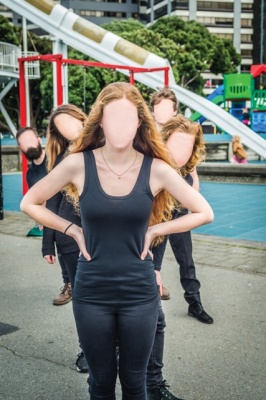OUR PARENTS’ CHILDREN
BATS Theatre (Out-Of-Site) Cnr Cuba & Dixon, Wellington
18/07/2014 - 02/08/2014
Young & Hungry Festival of New Theatre 2014 20th Anniversary
Production Details
Our Parents’ Children is a gothic fairytale about a strange girl who thought she could rewrite the past – and the price that we all paid for it.
Once there was a girl called Mary. Mary lived with her father. Mary’s mother left when Mary was little, and all she had to remember her by was a lock of hair, kept in a golden necklace. Mary had a boyfriend, called Joe.
Joe had ideas. And Mary had access to scientific equipment. And they both were very, very angry at the world. And as the saying goes, if you cannot inspire love, you can always cause fear.
YOUNG AND HUNGRY 20TH ANNIVERSARY FESTIVAL OF NEW THEATRE 2014
6.30pm – Our Parents’ Children
8.00pm – Second Afterlife
9.30pm – Uncle Minotaur
Season: Friday 18 July – Saturday 2 August
BATS Theatre, Cnr Cuba @ Dixon Sts
(no show Sun/Mon)
Tickets: $18 / $14 / Groups 6+ $13 / School Groups 6+ $10
Season Passes: $45 / $36 / $25
CAST
Mary: Angel Faifai
John (Mary's father): Owen Baxendale
John Chorus: Jasper J-Healey, Harry Calverley, Jack Hallahan
Joe: Kelly Moen
Shelley: Ailise Beales
Shelley Chorus: Madeline McIntyre Wilson, Emma-Yvonne Simons, Tessa Patrick
Ms Steele Chorus: Taupuruariki Brightwell, Amy Griffin-Browne, Hen Priestley
Police: Makuei Aken, Duncan Armstrong
Newscasters: Isaac Adams, Elea Yule
CREW
Assistant Director: Tony Black
Assistant Director: Matt Loveranes
Stage Manager: Madison McGee
Stage Manager: Harriet Lane-Tobin
Set Design: George Fenn
Set Design Assistant: Taryn Burley
Costume Design: Lara Baker
1hr
The good bits are excellent
Review by John Smythe 19th Jul 2014
The plays in this 20th anniversary season of the Young and Hungry Festival of New Theatre would have been inconceivable two decades ago. The internet had been invented, the World Wide Web was in its infancy but it had yet to permeate our lives in the ways these play explore.
The first and last plays also deal with dysfunctional parent-child relationships where one parent has left the home: a device that motivates the semi-abandoned child / young adult’s recourse to cyberspace in search of truth, reality and the meaning of life. (Each play will be reviewed separately, to better facilitate Comments from anyone who feels so moved.)
Alex Lodge’s Sci-fi ‘gothic fairytale’, Our Parents’ Children, set in the very near future, pairs Mary (Angel Faifai) with her Skype-buddy Joe (Kelly Moen) from the USA’s Bible Belt. Whereas under-parented Mary’s mother has left and her workaholic father, John (Owen Baxendale) only comes home to slug a whisky and take to his study, over-parented Joe has been brought up in a crushingly Christian community.
Seen only via intriguingly warped projection on the loose calico walls of George Fenn’s set, and heard in amplified voice to add to his assumed status, the anti-establishment idealist and activist Joe has influenced the relatively naïve Mary with his bizarre plans for a better future, and her contribution to the effort is incubating, as the play begins, in what looks like a modified freezer at the back of the garage.
But Mary does have a mind of her own and she has not obeyed Joe’s instructions to the letter. Suffice to say the treasured lock of her mother’s hair, kept in a locket around her neck, has been instrumental in bringing the ‘experiment’ to life. She is named Shelley and principally played by Ailise Beales, supported by a chorus of clones (Madeline McIntyre Wilson, Emma-Yvonne Simons, Tessa Patrick). You’ll have to see it to understand more and see how it pans out.
John’s simple needs are serviced by an attentive trio (Jasper J-Healey, Harry Calverley, Jack Hallahan); Mary’s concerned teacher, Mrs Steel, also comes in triplicate (Taupuruariki Brightwell, Amy Griffin-Browne, Hen Priestley); a duo of Policemen (Makuei Aken, Duncan Armstrong) are no match for the enormity of Joe’s ‘solution’; two newscasters (Isaac Adams, Elea Yule) seem appropriately disconnected from the unfolding reality – and, strangely, appear live on stage rather than via camera.
I suspect the technology (the hand-held projector fails for a while on opening night and creates its own little drama) has diverted attention from some of the basics of theatre craft. There is some very awkward staging at times and the father-daughter relationship – or non-relationship – is clumsily commented on, physically, which doesn’t elicit empathy.
That said, the good bits are excellent – the central roles are strong; the multiple Shelleys have an eerily passive presence; the techno and backstage teamwork is tireless; Nina Estrella’s lighting, Sarah Burton’s sound design and Lara Baker’s costumes serve the show well – and it will doubtless evolve as the season continues. The more we can willingly suspend our disbelief and buy into the play’s proposition, the better.
Scientifically, the play’s attempt to suggest some kind of redemption could be in the offing is questionable but at a metaphorical level, and in terms of the point it makes about human values and personal responsibility, it’s welcome.
See also reviews for Second Afterlife and Uncle Minotaur.
Copyright © in the review belongs to the reviewer





Comments